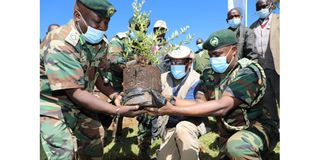No community targeted in Mau Forest restoration: Tobiko

Environment Cabinet Secretary Keriako Tobiko (centre) and a Kenya Forest Service officials plant a tree at the Maasai Mau Forest during an event to mark the first anniversary of restoration efforts, October 31, 2020.
What you need to know:
- Mr Tobiko issued the remarks on Saturday, dismissing claims that communities are being targeted for eviction.
- Speaking after leading the planting of over 10,000 trees to mark the first anniversary of the project, he said 10 million trees have been planted so far.
No community is being targeted amid efforts to restore the Maasai Mau forest, Environment Cabinet Secretary (CS) Keriako Tobiko has said.
Mr Tobiko issued the remarks on Saturday, dismissing claims that communities are being targeted for eviction.
“When the President ordered restoration of water towers across the country, no community was being targeted. The environment has no tribe. It doesn't know if you are a Maasai or a Kalenjin,” Mr Tobiko said, adding the directive was executive, not personal.
The CS attributed the project’s success to the President's commitment and support.
Speaking after leading the planting of over 10,000 trees to mark the first anniversary of the project, he said 10 million trees have been planted so far.
While stressing the importance of the water catchment area, he said, "Without the Mau forest there is no lifeline in the Mara Serengeti ecosystem and national parks, the pastoral communities in Narok and Kajiado counties, as well as Lake Natron, a major breeding ground for the lesser flamingos.”
Mr Tobiko noted the ecological value of Maasai Mau Forest as the upper catchment of major rivers including Mara, Amalo, Ewaso Ngiro, Nile, Lake Victoria, Lake Natron, Serengeti, and Maasai Mara parks among others.
He said that plans were underway to fence off Maasai Mau to ensure the security of the Maasai Mau Forest.
He appreciated the local community for voluntarily relocating from the forest area and working with the government to restore the forest.
The CS also appreciated KFS for ensuring the protection of the reclaimed forest, through the Joint Enforcement Team lead by SP David Mutoro of KFS.
The Mara-Serengeti ecosystem is known for the wildebeest migration, a major tourist attraction and phenomenon classified as the eighth Wonder of the World.
It is also an important biodiversity conservation area, is home to over 393 plant species, 132 bird species, 49 mammal species, 10 reptiles and amphibians, and 368 spider species.
The government reclaimed 4,500 ha of Mau land in 2018. The target of the ongoing second phase of the reclamation is 8,870 ha.
The exercise which was attended by the KFS Board led by Chairman Peter Kinyua, Chief Conservator of Forests Julius Kamau among others saw 110,000 indigenous trees planted on 100ha as part of the ongoing restoration of Maasai Mau.
This adds to the 13,400 ha of secured, restored, and rehabilitated forest land since 1st November 2019.
Environment PS Chris Kiptoo recognised the collaborative partnership towards the restoration of Senetwet block 65 where KFS contributed 44,900 indigenous tree seedlings.
Mr Kinyua noted that to secure the Maasai Mau Forest, KFS posted 120 Rangers for the last two years in Maasai Mau and Olposimoru operation areas.
He said that KFS had employed a multi-agency approach to secure forest resources against charcoal burning and realigning all forest boundaries to deal with encroachment and challenges of unclear boundaries.
He said that FFS had rolled out an online registration of private tree nurseries countrywide to boost the production of credible tree seedlings towards the attainment of a 10 per cent tree cover by 2022.
Mr Kamau appreciated the goodwill from Maasai community is ensuring the survival of tree seedlings and called for more partnerships towards the forest restoration process.
He noted that illegal grazing remained a great challenge to the survival of seedlings.





